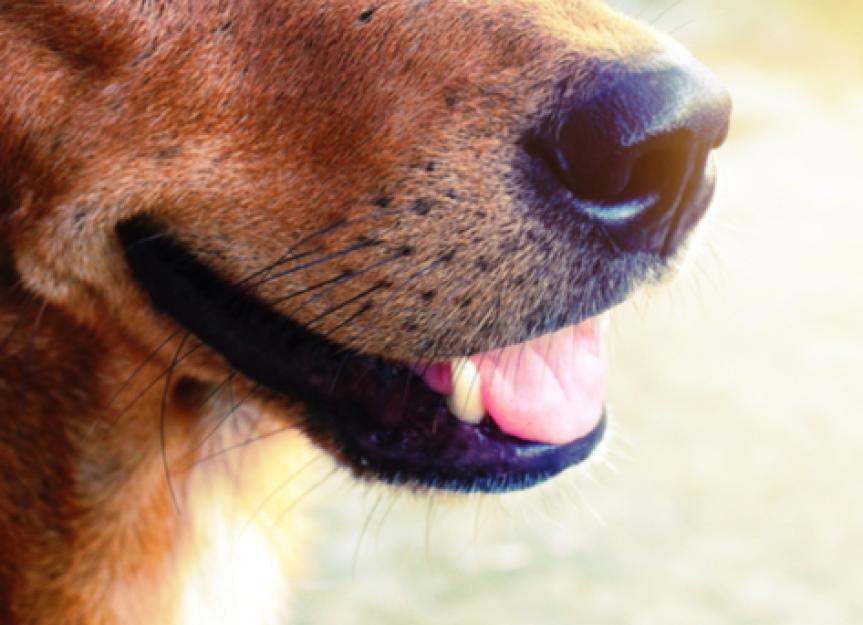Myths About Our Pets’ Mouths
I let my dog sleep in bed with me, but I don’t let him lick me. He is on monthly preventatives, and I bathe him regularly. I figure that’s good enough to reduce my risk of getting fleas, ticks, and intestinal parasites. But I think dog “kisses” are gross.
My dog doesn’t eat poop (that I know of), and I brush his teeth. But he licks himself in all the wrong places and puts all sorts of things in his mouth.
I have plenty of friends and colleagues who let their dogs lick their faces but wouldn’t dream of letting the dog in the bed. Whether or not it changes their mind (or yours) about dog kisses, here are some common myths about pets’ mouths, busted.
Myth: Pet Mouths Are Cleaner Than Human Mouths
Just as your dentist has always told you, brushing and flossing your teeth reduces the amount of bacteria in your mouth. So unless you brush your pet’s teeth more than you brush your own, the total number of bacteria in your mouth will be lower.
另一个兽医,我work recently conducted a study as part of her volunteer mentoring of high school students. They sampled bacteria from the mouths of healthy dogs and cats. Then they gave the dogs and cats dental cleanings and pulled any unhealthy teeth. After cleaning, they resampled the pets’ mouths. Prior to the cleanings, the mouths were very dirty and all kinds of bacteria grew. After, the mouths were much healthier. So if you let your dog lick you, at least keep their mouth clean with brushing and routine cleaning.
Of course, you may say that not all bacteria is equal, and you would be correct. There are over600 types of bacteriaknown to live in the mouths of humans and dogs (similar information isn’t available for cats yet). Researchers are still trying to learn about each type. The types of bacteria are dependent on many factors, including genetics, diet, and oral hygiene routine. Some bacteria promotes a healthy mouth while other types produce acid that destroys tooth enamel. Which leads to our next myth.
Myth: Dog Saliva Can Help Heal Wounds
Normal mouth bacteria are not the same across species. Nor are they the same between mouth and skin in the same species. When dogs lick a wound, it’s actually the physical act of removing dead tissue and environmental bacteria that does the healing. It is a bad idea to let your dog lick your open wound. The risk of infection from mouth bacteria is greater than any benefit. If you have a wound, wash it well and keep it protected from the environment. Let your pet help you heal withcuddles instead.
The type ofbacteria in a dog’s mouthis not the same kind that lives on human skin. This is also true for cats. Cat mouths are notoriously dirty and their bite can cause serious infections—both in humans and other cats. If you get bit by a cat, clean the wound thoroughly and seek medical attention. If your cat gets in a fight with another cat, have a veterinarian check him or her over for wounds. Cats’ sharp teeth deposit bacteria deep into skin where it festers and infection can spread.
The good news: If you are healthy, regularinteraction with your petsis not only safe but can actually improve your health. In general, it is a good idea to wash your hands after playing with your pet, especially before cooking or eating.
Caring for Your Pet’s Oral Health
Routine brushing and regular cleaning of your pet’s teeth can help promote not only ahealthy mouthbut a healthy body, too. Recently, the veterinary community has noticed that dogs with with dirty mouths often have evidence of inflammation in internal organs, including the liver and gastrointestinal system. Pearly whites aren’t just about looks.
如果你有一个food-motivated狗或猫,它很简单to teach them to get their teeth brushed at home. While this won’t reverse existing dental disease, it can help keep clean mouths healthy. When I clean my dog’s teeth I alternate between brushing (with a regular toothbrush) and giving him little licks of peanut butter. He thinks it’s a great game. There are many pet-specific toothpastes available, and you should never use human toothpaste. If you need more information about tools for healthy pet smiles, visitVOHC.orgfor a list of products proven to improve dental health.
Dr. Hanie Elfenbein is a veterinarian and animal behaviorist located in Atlanta. Her mission is to provide pet parents with the information they need to have happy, and healthy, and fulfilled relationships with their dogs and cats.
Help us make PetMD better
Was this article helpful?
